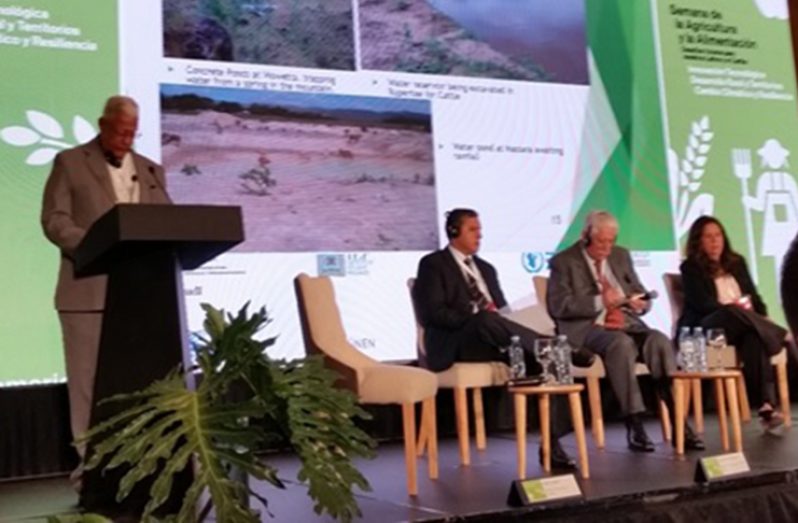THE demands on the world’s freshwater resources from increasing agriculture growth are unsustainable, Agriculture Minister, Noel Holder said during his address at the “Week of Agriculture and Food” held in Argentina on November 22 and 23, 2018.
Under the theme “Week of Agriculture and Food: Future challenges for Latin America and the Caribbean” Minister Holder said at this rate of water consumption growing twice as fast as the global population, agriculture’s share of water could be drastically reduced.
He called for a more profound transformation in Latin America and the Caribbean to ensure self-sufficiency.
Minister Holder identified areas for future collaborative work, regarding public policies and national programmes, in the area of climate change, sustainable agriculture and food and nutrition security.
The event served as a regional forum for the exchange of experiences, dialogue, and the construction of agreements between the regional bodies to further advance the sustainable development goal.
“As policy makers, we ask ourselves, how do we significantly increase agricultural production without further stressing our environment; or destroying our natural forests and, without further diminishing our water resources, to feed a world population, which is expected to increase from under 7 billion to about 9 billion by 2050?” he questioned.
To meet this demand, Minister Holder said those in agriculture in 2050 will need to produce almost 50 percent more food, feed and biofuel than they did in 2012.
He said about 80 percent of this increased production will have to be furnished from existing arable land through the production of higher yields.
“Agriculture is one of the pillars earmarked to forge a path of sustainable development for Guyana and the Caribbean. It is of fundamental significance to ensure food and nutrition security, and represents a viable mainstay on which to promote a green economy for our country,” holder posited.
Summits such as these, he said, augur well for governments of Latin America and the Caribbean to learn, engage, network and grow as it highlights the interface for collaboration as the countries work to expand its production base in a sustainable manner.
The agriculture sector, Minister Holder said, is undoubtedly one of the most important sectors in Guyana and continues to contribute over 16 percent to the economy. It is a sector that is crucial in terms of reducing unemployment, poverty alleviation and for bolstering economic development.
Significantly, he said sustainable food security is a goal that the sector aims to achieve by improving the quality and quantity produced by the crop, livestock and fisheries sub-sectors.
Guyana’s vast tracts of productive land present enormous opportunities for growth. However, according to Holder, high volatility in international commodity prices and extreme weather events, in recent years, have affected the agriculture sector.
“With a land area of 83,000 square miles but with almost 90% of its population occupying a strip of land approximately 200 miles long and 30 miles in width, and having 75% of the main economic activities concentrated on this low-lying coastal zone situated some six feet below sea level, Guyana is particularly vulnerable to the negative effects of climate change on its economy, human livelihoods and ecosystems,” he said.
Climate change is anticipated to have potentially disastrous impacts on the economic viability of the agricultural sector. The potential negative impacts that climate change can have on Guyana is significant if profound changes are not agreed upon.
The Food and Agriculture Organization (FAO) has projected that by 2030, the world will be faced with a 40 percent global water deficit under the business-as-usual climate scenario.
Groundwater provides drinking water to at least 50 percent of the global population and accounts for 43 percent of all of the water used for irrigation.
In addition, inappropriate use of fertilizers and pesticides has translated into water pollution, affecting rivers, lakes and coastal areas.



.jpg)








